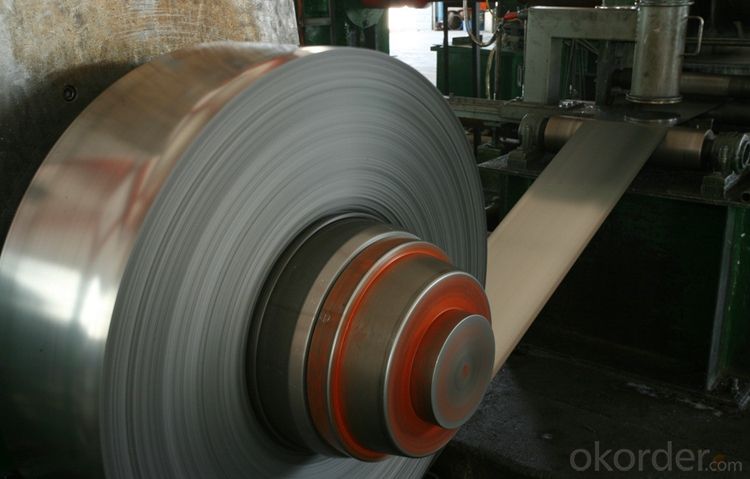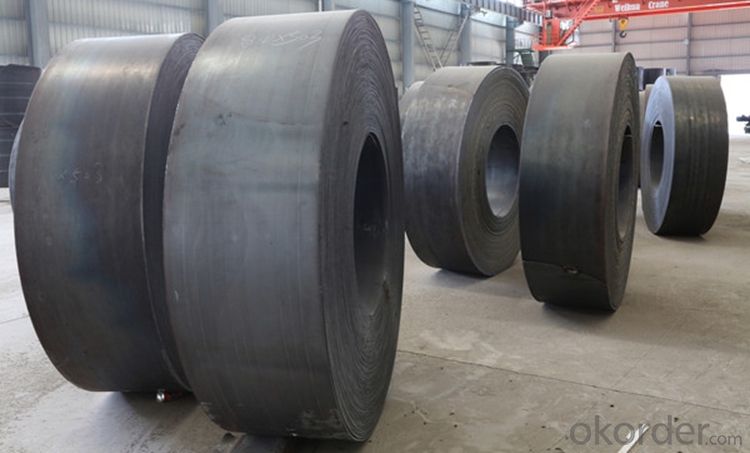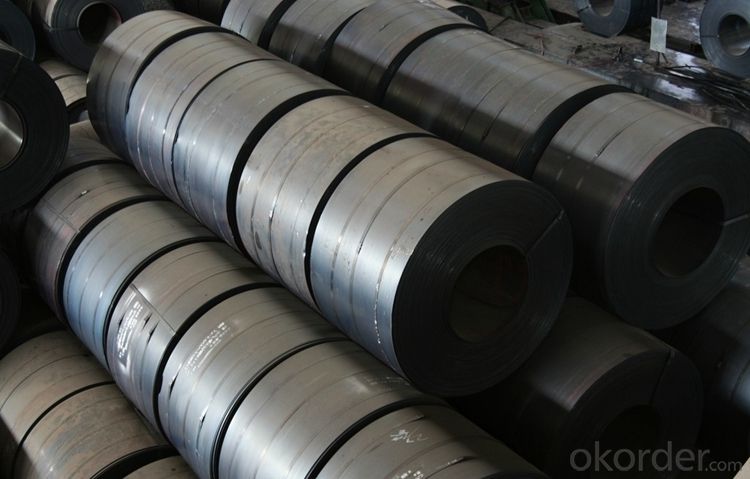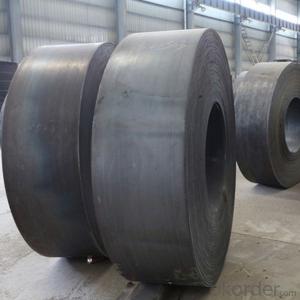Hot Rolls Steel Coils Cheap Price Made In China
- Loading Port:
- Tianjin
- Payment Terms:
- TT OR LC
- Min Order Qty:
- 25 m.t.
- Supply Capability:
- 20000 m.t./month
OKorder Service Pledge
OKorder Financial Service
You Might Also Like
Item specifice
DESCRIPTION FOR CARBON STEEL PLATE
Production | hot rolled steel coils ss400 |
Port | Tianjin, China |
Category | Minerals & metallurgy |
Thickness | 1.8-16mm |
Width | 1000-1500mm |
Coil Weight | about 23 tons |
Material Grade | SS400\Q235\Q345B |
Technique | Hot Rolled |
Standard | GB ,JIS |
Test | With Hydraulic Testing, Eddy Current , Infrared Test |
Surface | 1) Bared 2) Black Painted (varnish coating) 3) Galvanized 4) Oiled |
Package | in bundles, strapped by strips. Or as customer’s requirement |
Sample | Common products, we can provide freely, for special production,we can depends on negotiation. |
MOQ | 50 tons |
Payment | 100% L/C at sight, 30% T/T in advance, and the balance against the copy of B/L or negotiation |
Delivery time | Within 10-25 days, according to quantity, asap save customer’s time |
Certificate | ISO |
PACKING:
1.Big thickness:by bulk vessel
2.Small thickness:packed by steel strips and shipped by container
3.According to the requirements of customers'
TRADE TERMS :FOB, CFR, CIF
DETAILED PICTURES FOR STEEL COILS



EXPORT MARKET FOR STEEL COILS/SHEETS
Our target market is the international market. Every year we export most of products to countries like India, Pakistan, South Korea, Brazil, Australia, South Africa, Spain, Sri Lanka, Taiwan, Hong Kong, etc.
FAQ:
Q:How about the trade terms?
A:EXW,FOB,CFR,CIF will be accepted.
Q:How about your payment terms?
A:30%TT in advance and the balance against of copy of B/L.The irrevocable L/C at sight will be accepted.
- Q:How are steel coils used in the production of elevator components?
- Steel coils play a crucial role in elevator component manufacturing. Crafted from high-quality steel specifically designed to meet the demanding requirements of elevator production, these coils are indispensable. Elevator doors heavily rely on steel coils. These coils undergo processing into flat sheets, which are then cut into desired dimensions for door creation. The doors must possess strength and durability to endure frequent use and ensure passenger safety. Steel coils provide the necessary structural integrity and resistance to deformation, essential characteristics for elevator doors. Furthermore, steel coils find application in the manufacturing of elevator cabins. After processing, the coils are molded into various shapes to construct cabin walls and flooring. Steel's strength and rigidity make it an ideal material for this purpose, enabling it to handle heavy loads and establish a secure and stable environment for passengers. Additionally, steel coils find utility in the production of elevator shafts. Rolled into cylindrical forms and welded together, these coils serve as the structural framework for the shafts. The shafts demand strength and rigidity to support the elevator's weight and ensure smooth and safe vertical movement. Steel coils fulfill these requirements by providing the necessary strength, stability, and load-bearing capacity for this critical elevator system component. To summarize, steel coils play a vital role in the production of elevator components, including doors, cabins, and shafts. Their strength, durability, and versatility make them suitable for creating reliable and secure elevator systems that efficiently transport passengers.
- Q:What are the common surface finishes for steel coils?
- Steel coils can have various surface finishes, depending on specific requirements and applications. Some commonly used finishes include: 1. Hot-dip galvanization: This involves immersing the steel coil in molten zinc to create a protective layer. It offers excellent corrosion resistance and is often used outdoors. 2. Electro-galvanization: In this process, a thin layer of zinc is electroplated onto the steel coil. It provides good corrosion resistance and a smooth finish, making it suitable for automotive parts and appliances. 3. Galvannealing: Steel coils are coated with a zinc-iron alloy through a high-temperature annealing process. This finish improves paint adhesion and offers excellent corrosion resistance, making it ideal for automotive parts and construction materials. 4. Tinplating: A thin layer of tin is applied to the steel coil, providing excellent corrosion resistance and a shiny appearance. Tinplate is commonly used for packaging materials and cans. 5. Pre-painting: Steel coils are coated with a layer of paint, offering corrosion resistance and an attractive finish. It is often used for building materials like roofing and siding. 6. Cold-rolling: Steel coils are rolled at room temperature, resulting in a smooth and clean surface. Cold-rolled coils are used when a high-quality surface finish is required, such as in automotive parts and appliances. These are just a few examples of the surface finishes available for steel coils. The choice of finish depends on desired properties, such as corrosion resistance, appearance, and specific application requirements.
- Q:i want to buy an exhaust but whats the difference between satinless steel and titanium exhaust?
- titanium is a light-weight silvery metallic element that is corrosion-resistant while a stainless steel is a steel containing atleast 12 % chromium and is also corrosion-resistant. both are good choices for a new exhaust.
- Q:What is the process of recycling steel coils?
- To ensure optimal utilization of material and minimize waste, several steps are undertaken in the recycling of steel coils. To begin, steel coils are gathered from a variety of sources, including industrial manufacturing facilities, construction sites, and scrap yards. These coils are then transported to a recycling facility where their quality is thoroughly assessed and the appropriate recycling method is determined. Following this, the steel coils are cleansed to eliminate any contaminants such as dirt, oil, or paint. This cleansing process may involve the use of chemical agents or mechanical procedures, depending on the extent of contamination. The cleansing of the coils is crucial in maintaining the quality of the recycled steel. After the cleansing process, the coils are either shredded or sheared into smaller pieces for easier processing. This step helps to increase the surface area, making it simpler to separate the steel from any other materials that may be present within the coils. Once the coils have been broken down into smaller pieces, they undergo magnetic separation. This entails passing the steel pieces through a magnetic separator that utilizes powerful magnets to attract and separate the ferrous steel from non-ferrous materials like aluminum or plastic. This separation is vital in ensuring the purity of the recycled steel. The separated steel pieces are then subjected to extremely high temperatures in a furnace, causing them to melt. This melting process not only eliminates any remaining impurities but also allows the steel to be shaped into various forms and molds, depending on its intended use. Following the melting process, the molten steel is poured into molds or cast into ingots to solidify. These ingots can be further processed and transformed into new steel products or used as raw material in different industries. Throughout the recycling process, the steel coils are subjected to quality control measures to guarantee that the resulting recycled steel meets the necessary specifications and standards. This includes conducting chemical analyses and mechanical tests to verify the strength, composition, and overall quality of the recycled steel. In conclusion, the recycling of steel coils involves the collection, cleansing, shredding, separation, melting, and molding of the steel to produce new products or raw material. This process not only conserves valuable resources but also reduces the environmental impact associated with traditional steel production.
- Q:How do steel coils contribute to the automotive lightweighting trend?
- Steel coils contribute to the automotive lightweighting trend by providing a strong and lightweight material that can be used to manufacture various components and structures in vehicles. Due to their high strength-to-weight ratio, steel coils allow automakers to reduce the overall weight of the vehicle without compromising on safety or performance. This enables vehicles to achieve better fuel efficiency, lower emissions, and improved handling, all of which are key goals of the lightweighting trend in the automotive industry.
- Q:What are the uses of galvanized steel coils?
- Galvanized steel coils have a wide range of uses in various industries due to their unique properties. Here are some common uses of galvanized steel coils: 1. Construction: Galvanized steel coils are widely used in the construction industry for various applications. They are used to manufacture roofing sheets, wall panels, and structural components. The galvanized coating helps to protect the steel from corrosion, extending its lifespan and ensuring durability in harsh weather conditions. 2. Automotive industry: Galvanized steel coils are used in the automotive industry for manufacturing different parts and components. These coils are used to manufacture body panels, chassis, and other structural parts of vehicles. The galvanized coating provides excellent corrosion resistance, which is crucial for the longevity of automobiles. 3. Appliances: Galvanized steel coils are used in the production of various household appliances, such as refrigerators, washing machines, and air conditioners. The coils are used to manufacture the outer panels and cabinets of these appliances, providing them with a strong and durable structure. 4. Agriculture: Galvanized steel coils find applications in the agriculture sector as well. They are used to manufacture agricultural equipment, such as grain storage silos, irrigation systems, and livestock enclosures. The galvanized coating protects the steel from rust and corrosion, ensuring the safety and longevity of these agricultural structures. 5. Industrial applications: Galvanized steel coils are widely used in various industrial applications. They are used for manufacturing ductwork, ventilation systems, and industrial piping. The galvanized coating helps to resist chemicals, moisture, and other environmental factors, making it an ideal choice for industrial environments. 6. Electrical industry: Galvanized steel coils are used in the electrical industry for manufacturing electrical enclosures, conduit pipes, and cable trays. The galvanized coating provides excellent protection against corrosion and ensures the safety and durability of electrical installations. 7. Furniture manufacturing: Galvanized steel coils are used in the furniture manufacturing industry for producing furniture frames, shelves, and cabinets. The galvanized coating adds strength and durability to these furniture pieces, making them long-lasting and resistant to corrosion. Overall, galvanized steel coils have a wide range of uses in various industries due to their excellent corrosion resistance, durability, and strength. They are a cost-effective and reliable choice for applications that require protection against rust and environmental factors.
- Q:How are steel coils used in the production of metal cladding?
- Steel coils serve as the primary raw material for metal cladding production. Metal cladding involves covering a building's exterior with a layer of steel to enhance its durability, aesthetics, and insulation. To begin the manufacturing process, galvanized steel coils are used. These coils are made by coating steel with zinc to prevent corrosion. They are then unrolled and fed into a roll-forming machine, which shapes them into the desired profile for the cladding panels. Once the coils are formed, they undergo various processes to improve their properties. These processes include cutting, perforating, and embossing to create patterns, textures, or openings in the panels. Additional protective layers, such as paint or powder coating, can also be applied to enhance corrosion resistance and appearance. The shaped and processed coils are assembled into metal cladding panels. These panels interlock seamlessly to create an appealing exterior for buildings. They can be attached to the building's structure using screws, clips, or adhesives. Using steel coils in metal cladding production offers several advantages. Steel is a strong and durable material, making it suitable for exterior applications that require resistance to weathering, impact, and other environmental factors. It also allows for a wide range of design options and customization. In summary, steel coils are essential in the production of metal cladding. They serve as the raw material, which is shaped, processed, and assembled into panels that enhance buildings' protection, aesthetics, and insulation properties.
- Q:During fatigue testing of any material (especially for steels), why is strain-control mode preferred over stress control mode?
- because metals, like steel, are ductile and will stretch before breaking. Straining the metal is stretching it, stressing the metal is applying a shearing force or bending until there is an actual metal failure. A sheet metal strap 1inch across and 24 gauge metal is commonly used to support metal ducting systems in construction. These have an average strain to failure weight load as high as 16,200 lbs. As reported by the smacna index, they will safely hold 6800 pounds. Of more interest is the screws used to hold the strap to the duct. While they are grade 3, fairly strong, they strain to 1400 pounds when properly installed, and are safely able to support 650 pounds, unless they are overtorqued (stripped) and this quickly drops to 400 pounds and 125 pounds...big difference.
- Q:What are the safety regulations for steel coil production facilities?
- Safety regulations for steel coil production facilities vary depending on the specific country or region, but there are some common safety measures that are typically implemented in these facilities. One key safety regulation is the proper training and education of employees. All workers in steel coil production facilities should be trained on the potential hazards they may encounter, as well as the proper safety procedures to follow. This includes training on handling heavy machinery, operating cranes or forklifts, and understanding the risks associated with working in a high-temperature environment. Another important safety regulation is the maintenance and inspection of equipment. Regular inspections of machinery and equipment should be conducted to ensure they are in proper working condition and do not pose any safety risks. Furthermore, maintenance procedures should be implemented to address any issues or malfunctions promptly. Fire safety is also a crucial aspect of safety regulations in steel coil production facilities. Fire prevention measures such as the installation of fire alarms, sprinkler systems, and fire extinguishers should be in place. Regular fire drills should also be conducted to ensure that all employees are aware of the evacuation procedures and can respond quickly and effectively in case of a fire emergency. Personal protective equipment (PPE) is another vital safety requirement in steel coil production facilities. Employees should be provided with appropriate PPE such as safety glasses, helmets, gloves, and steel-toed boots to protect them from potential hazards such as falling objects, sharp edges, and high temperatures. Additionally, safety regulations often require the implementation of safety barriers and guards around machinery and equipment to prevent accidents and injuries. This includes safety gates, railings, and protective covers to restrict access to hazardous areas and prevent unauthorized entry. Regular safety audits and inspections should be conducted by relevant authorities or safety professionals to ensure compliance with safety regulations. Companies should also encourage a culture of safety by promoting open communication about safety concerns, providing safety training and refresher courses, and rewarding employees for their adherence to safety protocols. It is important to note that safety regulations may vary from one jurisdiction to another, and it is always advisable to consult the specific regulations applicable in the country or region where the steel coil production facility is located.
- Q:How are steel coils used in construction?
- Steel coils are commonly used in construction for a variety of purposes, such as creating structural frameworks, reinforcing concrete, and manufacturing various building components like beams, columns, and trusses. The coils are unrolled and cut to specific dimensions, allowing them to be easily shaped and welded into various structural elements. This versatile material provides strength, durability, and flexibility, making it an essential component in constructing buildings, bridges, and other infrastructure projects.
1. Manufacturer Overview |
|
|---|---|
| Location | |
| Year Established | |
| Annual Output Value | |
| Main Markets | |
| Company Certifications | |
2. Manufacturer Certificates |
|
|---|---|
| a) Certification Name | |
| Range | |
| Reference | |
| Validity Period | |
3. Manufacturer Capability |
|
|---|---|
| a)Trade Capacity | |
| Nearest Port | |
| Export Percentage | |
| No.of Employees in Trade Department | |
| Language Spoken: | |
| b)Factory Information | |
| Factory Size: | |
| No. of Production Lines | |
| Contract Manufacturing | |
| Product Price Range | |
Send your message to us
Hot Rolls Steel Coils Cheap Price Made In China
- Loading Port:
- Tianjin
- Payment Terms:
- TT OR LC
- Min Order Qty:
- 25 m.t.
- Supply Capability:
- 20000 m.t./month
OKorder Service Pledge
OKorder Financial Service
Similar products
New products
Hot products
Related keywords
































